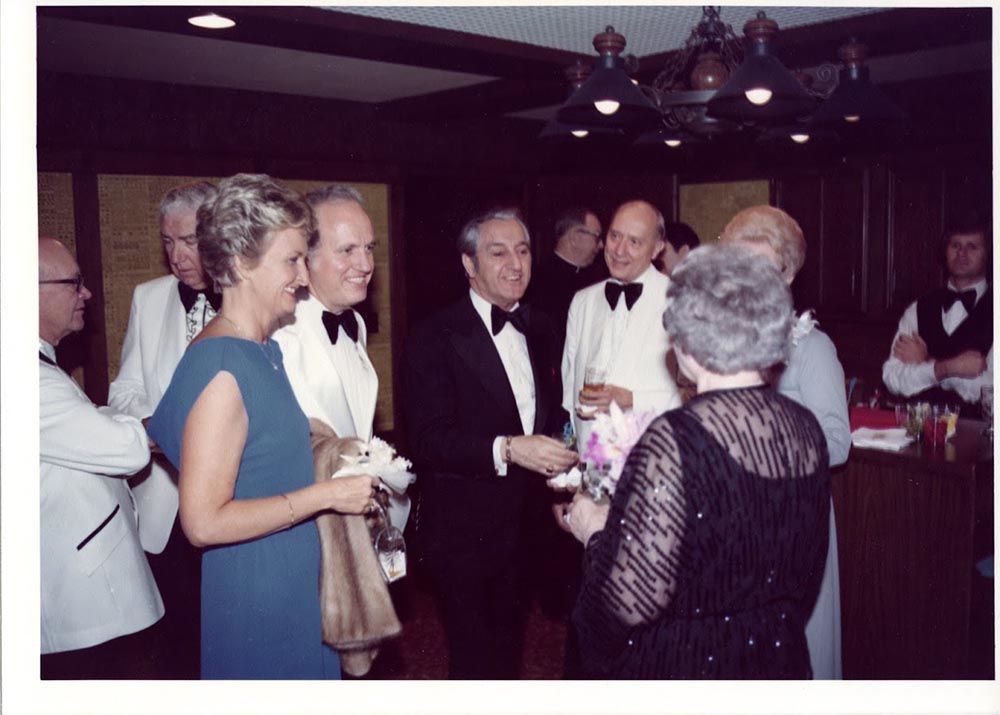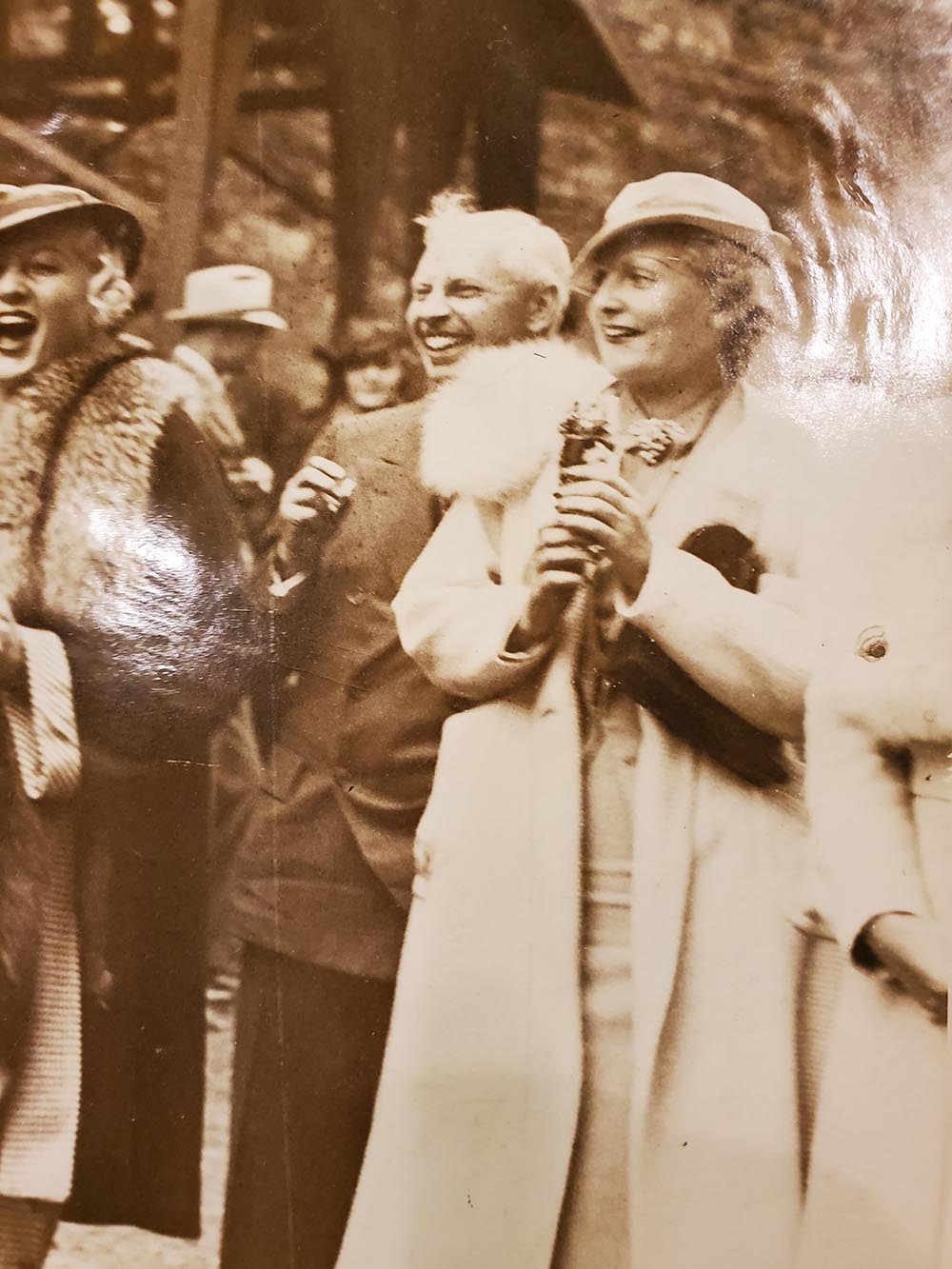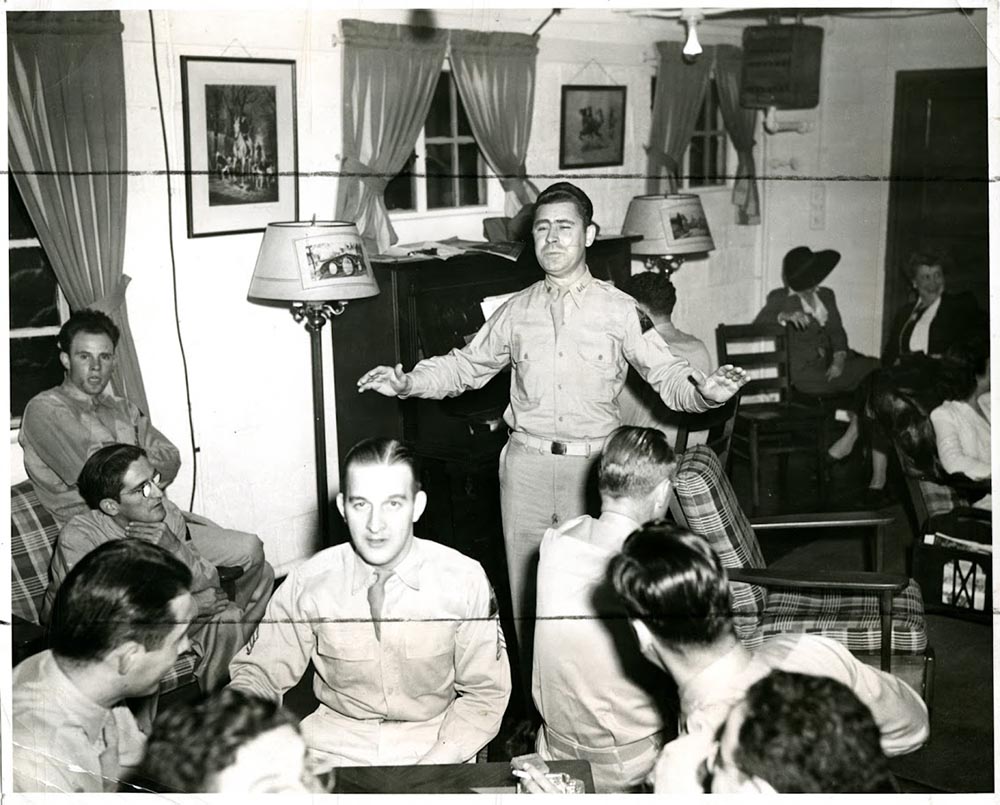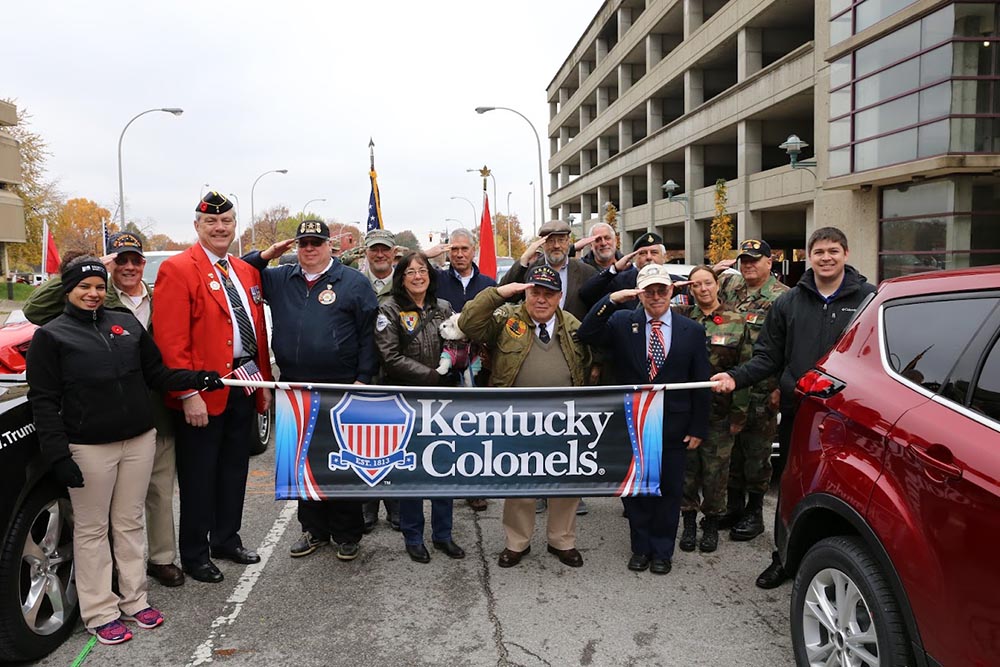The title Kentucky Colonel dates back to around 1813. The Kentucky Militia had just returned from a highly successful campaign during the War of 1812. When the militia disbanded, Governor Isaac Shelby commissioned Charles S. Todd, one of his officers in the campaign, as an aide-de-camp on the governor’s staff. Todd’s official rank and grade was colonel.
While early Colonels actually served military roles, the position took on a more ceremonial function in the late 1800s. Colonels in uniform attended functions at the governor’s mansion, stood as symbolic guards at state events, and the like. In the late 1920s, a group of Colonels started talking about forming a “society.” Governor Flem Sampson gave his blessings to the project, and late one Saturday afternoon in May of 1931, the first meeting of what would eventually become the Kentucky Colonels was held in Frankfort.

“Formulate a society to more closely band together this group into a great nonpolitical brotherhood for the advancement of Kentucky and Kentuckians,” Governor Sampson challenged. And they did. Minutes of the early meetings confirm that charitable programs were to be a central part of the organization. Social events would also play an important role. The group held a Derby Eve dinner for the first time in 1932.
Ruby Laffoon, who seemed to have had an innate sense of public relations and an affinity for Hollywood stars, replaced Sampson as Governor in 1932. Early on, Laffoon didn’t seem to take to the idea of a Kentucky Colonels society and somewhat shunned the organization, which was known then as The Kentucky Colonels. In December of 1932, Laffoon met with Colonel Anna Bell Ward Olson, who owned several movie theaters across Kentucky. A representative of theater owners nationwide who also held a Kentucky Colonel commission accompanied Colonel Olson. The meeting theoretically concerned movie censorship. However, what came out of the meeting was Laffoon’s commitment to Kentucky Colonels, and in particular a “new” organization to be called the Kentucky Colonels. Laffoon appointed Colonel Olson as secretary and keeper of the great seal.

Colonel Olson attacked her new position with fervor. Colonels around the world were contacted and invited to become members of the Kentucky Colonels. Social events were scheduled to coincide with the Kentucky Derby to attract as many individuals as possible. At the same time, Governor Laffoon started appointing Colonels with a similar zeal. Hollywood personalities such as Mae West, Bing Crosby, Fred Astaire and W.C. Fields not only became colonels, but also embraced the idea of the Kentucky Colonels.
The crisis that motivated the order to make a major impact on the state came with the disastrous Great Flood of 1937. The Kentucky Colonels appointed by Sampson and Laffoon, and organized by Colonel Olson, went to work. New York-based Colonels collected five dollars from each member (the equivalent of nearly $100 today). In California, colonels such as Fred Astaire held benefits to raise money for Kentucky. Recovery from the flood was still ongoing as the war in Europe broke out. As World War II loomed at the change of the decade, the “great nonpolitical brotherhood” was again mobilized.
Colonel Anna Friedman had taken over the duties of keeper of the great seal from Colonel Olson. It was a job that fit her perfectly. Not even Governor Laffoon enjoyed associating with the stars and the elite business community of New York as much as Colonel Friedman did. As the country prepared for war, Colonel Friedman again used funds donated by these honorary “Kentuckians” to set up recreation rooms for soldiers in training at Fort Knox.
By one count, Kentucky Colonels established and then posted signs in at least 35 facilities. The signs read, “Kentucky Colonels hope you hang out and have fun here.” Kentucky Colonels also set up and staffed the WAC recruiting office in Louisville.

Kentucky Colonel social events were cancelled during the war. However, a small group of colonels gathered annually at The Forest, Colonel Friedman’s Anchorage home, to drink a toast to the men and women in the service. It was, incidentally, at The Forest that the grand tradition of the Kentucky Colonels’ BBQ Reunion began in the late 1930s.
The years following the war saw the charitable side of the Kentucky Colonels grow rapidly. In 1946, colonels attending the annual Derby Eve Colonels banquet pledged money to help start the Kentucky “Country Doctors” fund. Today the fund is known, more politically correctly, as the “Rural Kentucky Medical Scholarship Fund.” It has helped hundreds of physicians attend medical school in return for a promise to practice in rural areas of the state. Kentucky’s first cancer treatment center and the Lions Eye Center also continue to serve Kentucky. Kentucky Colonels funded both in large part.
Colonels continue to contribute dollars to the goal of benefiting Kentucky and Kentuckians. Since 1951, as an IRS-recognized 501(c)(3) charity, the Kentucky Colonels have distributed over 7,000 grants to charitable and educational agencies all across Kentucky. For the last dozen years, the Kentucky Colonels’ board of trustees has distributed approximately $2 million each year, impacting the lives for more than 3.8 million people in and around Kentucky.
This year, someone in every county in the state will be touched by a program funded by the voluntary, tax-deductible contributions of Kentucky Colonels living in every state in the nation, as well as colonels living in 49 nations abroad.
So the next time you meet a fellow Kentucky Colonel, you can assume you are with a kindred spirit – someone like you who goes that extra step in kindness, goodwill and pride in the Commonwealth of Kentucky.
Q&A with Sherry Crose, Executive Director
What is your role with the Kentucky Colonels organization?
Executive director and keeper of the great seal.
What is the keeper of the great seal?
The Honorable Order has several historic items that have been created and celebrated over the decades, the great seal being one. This historic symbol (logo) was created in 1933, fashioned off the Seal of the Commonwealth. With the creation of the actual symbol of the organization, the governor at the time, Ruby Laffoon, appointed Anna Bell Ward Olsen as the first keeper of the great seal. She was from Lexington and appointed secretary to the Kentucky Colonels, and given the task of “organizing” commissioned colonels into what is today the Honorable Order. She was followed by Anna Friedman Goldman of Louisville in the 1950s. Colonel Anna is recognized as the individual who created a very success barbecue the day after Derby, and the Derby Eve Banquet held at the Galt House. In 1957 articles of incorporation were signed and noted in corporate minutes. The governor could still appoint the keeper of the great seal. That tradition faded after two more individuals were appointed keeper of the great seal, Dorothy Smith and Patty Boston, and by the early 1990s the title was seemly dropped. In 2017 a board of trustees member researched the title and determined that the title and responsibilities rest with the executive director’s position.
How has the role of the Kentucky Colonels evolved over the years?
Kentucky Colonels have been a social bunch since the 1800s, and that continues today. It has just evolved to more formalized events and chapters. Colonels want to meet colonels in their own hometowns, so the Honorable Order of Kentucky Colonels (HOKC) formalized groups by chartering chapters, beginning in 2021. Today there are 41 chapters and five of those are outside of the U.S.A. There is a chapter right here in Louisville, the Derby City Chapter.
Kentucky Colonels are individuals recognized for their giving nature and care for their communities, and that trait has strengthened over the last almost 100 years. When the flood of 1937 happened along the Ohio River, colonels who resided outside the commonwealth sprang into action and contributed money to help Kentuckians. That gifting generosity continued and has now evolved into a philanthropy program that grants over $3 million annually to over 300 different types of nonprofits in the commonwealth. Those dollars come annually from individual Kentucky Colonels who are touched that someone recognized and took the time to nominate them for their good deeds. Colonels who donate reside in every state and 49 countries, and they know their contributions stay in Kentucky! They know that the nonprofits are carefully researched and vetted by the board of trustees.
One piece of history that has not evolved since the 1930s is the nonpartisan, nonpolitical nature of the Honorable Order. This is the governor’s recognition program. However, HOKC gets the opportunity to take that meaningful title and continue to help Kentuckians.
What is the some of the charitable work that has been done by the order in recent years?
The Honorable Order has had a structured grant program beginning in 1951. The colonels granted funds prior to that, but not on a consistent, annual basis. The charitable work spans the spectrum of categories that impact Kentuckians. There are veteran and youth service nonprofits. There are nonprofits that support the poor, needy, and those facing health, rehabilitation or mental illness issues. Historic preservation, cultural activities, and nonprofits that support the disabled and provide education opportunities for adults and children are also supported, as well as nonprofits that care for our four-legged friends.
Over $64 million has been distributed since 1951 to over 1,800 distinctive nonprofits. Here in the Louisville area, examples of nonprofits assisted by the Kentucky Colonels are Alley Cat Advocates, Snacks in Sack, the Louisville Leopards, StageOne Family Theatre, Neighborhood House, Scarlet Hope, First Tee, South Louisville Community Ministries, and the Westend Token Club, just to name a few.
What is the most unique grant the Kentucky Colonels have gifted?
The most unique in our history were the two reindeer for the Life Adventure Center located outside of Lexington. These two were gifted to expose interurban youth to an animal they wouldn’t see in Kentucky. Interesting grants recently have included a kitten incubator for a small humane society in Edmondson County; paying for the repair of a leaking conservation pond used to water a community garden that is tended by inmates from the county jail where food is grown, to give away to low-income residents in Marion County; purchasing trendy gym shoes for low-income youths who just want to fit in with their peers; a historic headstone for the first woman who was named a Kentucky Colonel for her work during World War I; and for sensory rooms and play equipment for youths and adults.
What lies ahead for the Honorable Order?
The organization is coming up on its 100th anniversary on May 2, 2031, and HOKC would like to help nonprofits in every county in Kentucky. Currently HOKC has helped nonprofits in 76 counties out of 120. It is the goal of the volunteer board of trustees to fund every qualified grant, which doesn’t mean every grant that is submitted. The Honorable Order funds needs – not wants – of nonprofits. The trustees take spending the generous contributions from colonels very seriously, because it is also their donations that support nonprofits in Kentucky. HOKC is organizing more ways for colonels to meet other colonels through volunteer days of service, creating events in other cities outside of Kentucky for colonels, and highlighting amazing achievements of Kentucky Colonels and by Kentucky Colonels.






